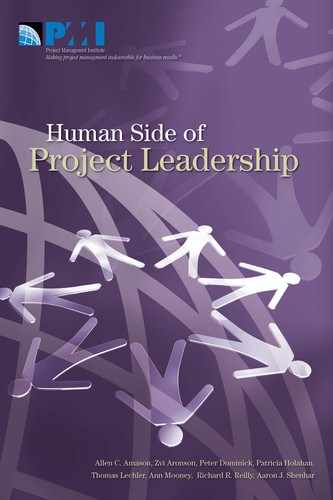Preface
Since its inception as a formal discipline, project management has typically focused on operational performance, planning, and meeting time and budget goals. Training in project management has been directed primarily toward mastering project management tools and applications. Yet, as research has shown, project success depends to a large extent on human behavior, especially leader behavior. Great leaders capable of unleashing the energy in people can be instrumental in the great success of projects. However, so far, the human side of project leadership has been an understudied area.
This report describes three related aspects of the human side of projects: leadership, project spirit, and conflict. Our objective is to provide a better understanding of these three critical areas of human behavior as they are manifested in project contexts.
Study 1—Leadership Study
The first study focused on transformational leadership in projects. Transformational and transactional leadership summarize behaviors that can be used to characterize the styles of different types of leaders (Bass 1985), although effective leaders often exercise components of both (Yukl 2001). Transformational leadership includes four behaviors (Yukl 2001):
1. Idealized influence supports member development of a strong positive identification with the leader and includes charismatic behavior.
2. Individualized consideration supports followers by fostering personal efficacy.
3. Inspirational motivation presents a collective purpose resulting from a clear vision articulated by the leader.
4. Intellectual stimulation encourages member participation and contribution in developing a solution. These behaviors, individually and collectively provide the foundation for individual commitment and a sense of ownership (Ryan and Reilly 2005).
Our first study examined the influence of both transformational and transactional leadership on project success. This study is one of very few that has looked at how transformational leadership impacts performance of groups and the only empirical study with data on transformational leadership and project performance. The first study has implications for project management, the most important being that transformational leadership behaviors are important. These behaviors, which focus on how the project manager interacts with project team members, have a significant influence on a variety of project outcomes including efficiency, effectiveness, business outcomes, and customer satisfaction. A second implication follows from the first: project managers should be trained and developed in transformational leadership. Of course not all situations will demand or permit transformational leadership, but having the knowledge and skill necessary to apply transformational leadership will strengthen the role and the influence that project managers can have on project outcomes.
Study 2—Project Spirit Study
Project spirit is a term used to describe the collective attitudes, emotions, and norms of behavior that characterize the members of a project team. As we know from research and theories, effective leaders are capable of creating the spark that ignites the energy in people; this sets free the untapped power imbedded in almost everyone. Outstanding project managers use these principles with their project teams. They develop a vision, which creates excitement and unleashes talent. Projects, more than anything else, are a natural ground for organizational excitement. Exceptional project leaders concentrate on human energy by combining vision and culture to create a unique experience in their projects. The objective of our second study is to identify the constructs that characterize the different facets of project spirit, develop operational definitions to measure the intensity and quality of the facets of project spirit, and examine the relationship between project spirit and project outcomes. Using a multiple-case study methodology, we examined how project leaders created the right project spirit and how this spirit contributed to project success. Some of the key case study results showed that project spirit can create a sense of excitement that can help to energize project team members. Some of the ways that spirit can be engendered include creating and maintaining an exciting vision, creating inspiring project names, using rituals, ceremonies, and icons, and having policies that encourage team spirit.
Study 3—Conflict Resolution Study
Project leaders must be able to manage conflict effectively. Two types of conflict typically occur in projects and other teams. Cognitive conflict is usually associated with effective decision outcomes and affective conflict is associated with poor decision outcomes. Cognitive conflict is often encouraged but may provoke affective conflict. There are no clear explanations as to why affective conflict occurs or how it can be avoided. Our third study examined the determinants of cognitive and affective conflict in a sample of 94 project teams and assessed the impact of other variables that might explain why cognitive conflict so often mutates into affective conflict.
The implications of our final study have to do with the way that project managers manage conflict in project teams. The desire to have a constructive dialogue around processes, tasks, and ideas carries some risks. Constructive conflict can easily mutate into destructive conflict where things become personal and impedes the effectiveness of the team. Part of the leadership role of project managers is to create conditions that promote behavioral integration and trust among project team members. This means ensuring that members feel collectively accountable, share information and resources, and see themselves as a true team.
